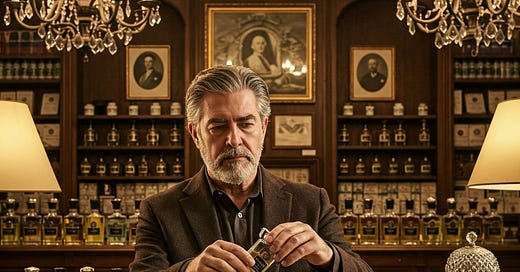Creed: The Scent of Power
Creed is one of the most prestigious luxury fragrance houses in the world. Established in 1760, the brand built its reputation through a heritage-driven business model, ultra-premium pricing, and word-of-mouth marketing. Unlike mass-market fragrance brands, Creed maintains an air of exclusivity and craftsmanship, making it a fascinating case study in luxury brand management.
The Founding and Evolution of Creed
Creed began in London in 1760, founded by James Henry Creed as a tailoring house that catered to European aristocracy. It wasn’t until the mid-1800s that Creed shifted towards perfumery, allegedly creating bespoke fragrances for royalty and high society. The brand eventually relocated to Paris in 1854, where it further solidified its legacy as a luxury fragrance house.
For most of its modern history, Creed was a family-owned business led by Olivier Creed and later his son, Erwin Creed. In June 2023, Creed was acquired by Kering, marking a major transition from family ownership to being part of a global luxury conglomerate.
Creed's USP
I. Heritage & Storytelling: The Power of Legacy
One of Creed’s biggest selling points is its centuries-old history. Whether through actual royal connections or clever branding, Creed positioned itself as the perfume house of nobility. Their perfumes are often linked to historical figures like Napoleon Bonaparte (Aventus) and Queen Victoria (Fleurs de Bulgarie), reinforcing the idea that Creed is a brand of power, sophistication, and exclusivity.
II. Premium Ingredients & Handcrafted Production
Creed differentiates itself by emphasizing:
High natural ingredient concentration (rather than being heavily synthetic).
Traditional infusion techniques in fragrance production.
Hand-blended perfumes, setting itself apart from mass-market brands that rely on industrial processes.
This focus on craftsmanship justifies Creed’s high-end pricing, making it desirable to luxury consumers who seek artisanal quality.
III. Pricing Strategy: A Status Symbol Approach
Creed perfumes are among the most expensive on the market, typically retailing between $300 and $1,700 per bottle. This pricing strategy aligns with the Veblen goods concept, where higher prices make a product more desirable due to its exclusivity.
Their top-selling fragrance, Aventus, is a prime example:
Launched in 2010, it became a status symbol among executives, celebrities, and fragrance collectors.
The premium pricing reinforced its exclusivity.
Enthusiasts seek specific batch numbers, creating a collector’s market around variations in scent.
IV. Marketing Strategy: A Mix of Exclusivity & Strategic Placement
Creed historically avoided traditional advertising, unlike competitors such as Chanel or Dior. Instead, its brand awareness relied on:
Placement in luxury department stores (Harrods, Bergdorf Goodman, Neiman Marcus).
VIP clientele & exclusivity, making customers feel like they are part of an elite club.
Word-of-mouth marketing, especially in fragrance enthusiast communities.
While Creed does not engage in mass-market celebrity endorsements, it benefits from luxury influencers and niche fragrance reviewers who reinforce its prestige.
Challenges & Opportunities in the Luxury Fragrance Market
I. Competition from Modern Niche Brands
While Creed pioneered luxury niche perfumery, competitors such as Maison Francis Kurkdjian, Roja Parfums, and Amouage have emerged with:
Strong digital marketing strategies that target younger luxury buyers.
More diverse storytelling that resonates with modern audiences.
Creed’s challenge is to modernize its brand appeal without compromising its old-world charm.
II. Maintaining Brand Prestige After the Kering Acquisition
Creed’s acquisition by Kering in 2023 introduced concerns about whether it would maintain its artisanal production methods or become more mass-produced to drive profits. Many luxury brands struggle with this after being acquired by large corporations.
To maintain exclusivity, Creed might consider:
Prevent overproduction, which could dilute its rarity.
Expand strategically, focusing only on high-end markets.
Ensure its signature craftsmanship remains intact, even as it scales.
III. The Future of Creed: Digital Expansion & Direct-to-Consumer Sales
While Creed has historically relied on luxury retail partnerships, it is increasingly building a direct-to-consumer (DTC) presence, including:
E-commerce expansion to give customers exclusive access to certain products.
Luxury fragrance consultation services to elevate the customer experience.
More engagement with niche fragrance influencers to stay relevant in digital spaces.
This shift allows Creed to control its brand image and pricing while expanding its global luxury customer base.
Creed is an outstanding example of a luxury brand that thrives on storytelling, exclusivity, and craftsmanship. By maintaining high prices, leveraging historical claims, and focusing on premium placement, Creed has positioned itself as the Rolls-Royce of fragrances.
However, with increasing competition and new corporate ownership, its challenge is to evolve while retaining its core identity. If executed well, Creed can continue to dominate the ultra-premium fragrance space for years to come.
Join us: ➡️ Instagram | Telegram | X ⬅️



